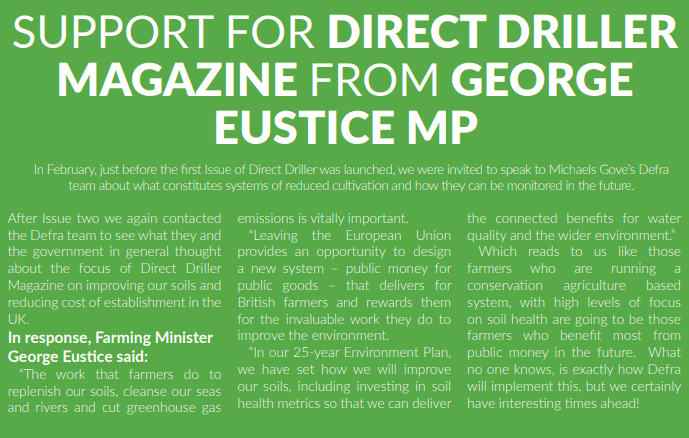No-till remains the most exciting, and challenging, development in global farming today. My six years of continuous and enthusiastic journalism on the subject has come at a time of an ever-increasing flow of information. For notillers and those contemplating it, knowledge is essential. However there’s another challenge: getting information into the world of farm supplies and also farm education. Making the most of the new techniques; having knowledge and sharing the experience to predict and avoid pitfalls, all involve effective research and development. No-till has already had an impact on machinery, but crop rotation, fertiliser use, seed rates, timeliness are topics that present equal challenges to both the notill farmer and advisor, and all are comparatively new. Farm suppliers have an obvious need for genuine knowledge and experience which they can hand on to customers. Education is front-line and key to success. This third issue of Direct Driller shares a great deal of information that is of direct relevance to all those involved in the technique. Behind these pages is a huge wealth of knowledge, and the intention of this publication is to bring people together for the benefit of everyone involved.
SUPPORT FOR DIRECT DRILLER MAGAZINE FROM GEORGE EUSTICE MP
In February, just before the first Issue of Direct Driller was launched, we were invited to speak to Michaels Gove’s Defra
team about what constitutes systems of reduced cultivation and how they can be monitored in the future.
After Issue two we again contacted the Defra team to see what they and the government in general thought about the focus of Direct Driller Magazine on improving our soils and reducing cost of establishment in the UK. In response, Farming Minister George Eustice said: “The work that farmers do to replenish our soils, cleanse our seas and rivers and cut greenhouse gas emissions is vitally important. “Leaving the European Union provides an opportunity to design a new system – public money for public goods – that delivers for British farmers and rewards them for the invaluable work they do to improve the environment. “In our 25-year Environment Plan, we have set how we will improve our soils, including investing in soil health metrics so that we can deliver the connected benefits for water quality and the wider environment.” Which reads to us like those farmers who are running a conservation agriculture based system, with high levels of focus on soil health are going to be those farmers who benefit most from public money in the future. What no one knows, is exactly how Defra will implement this, but we certainly have interesting times ahead!
